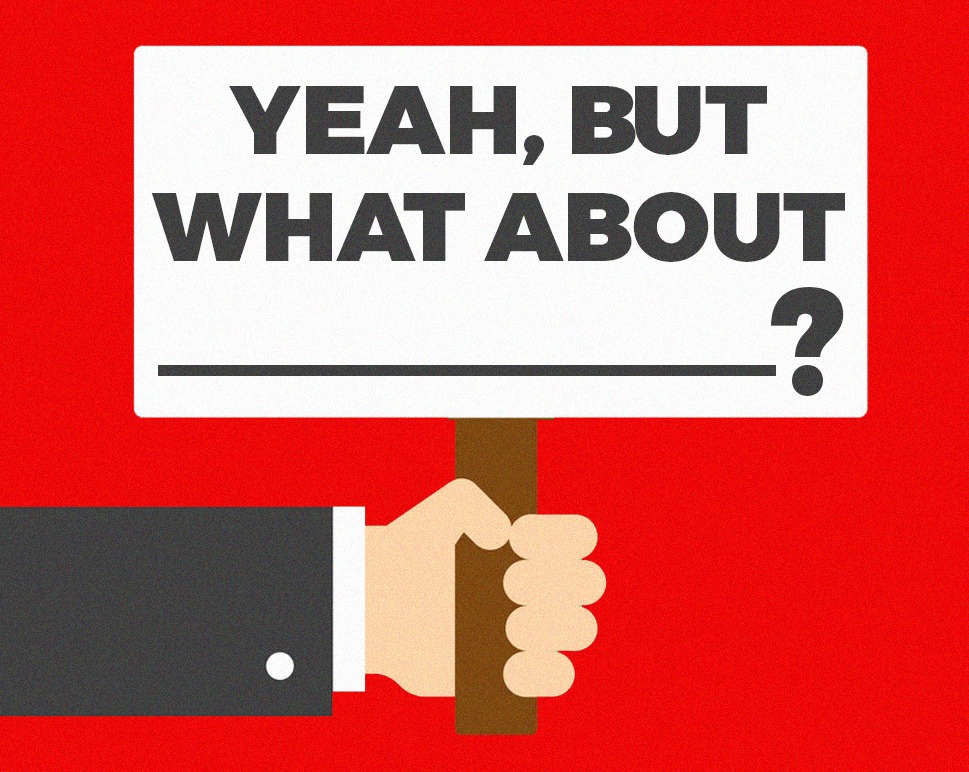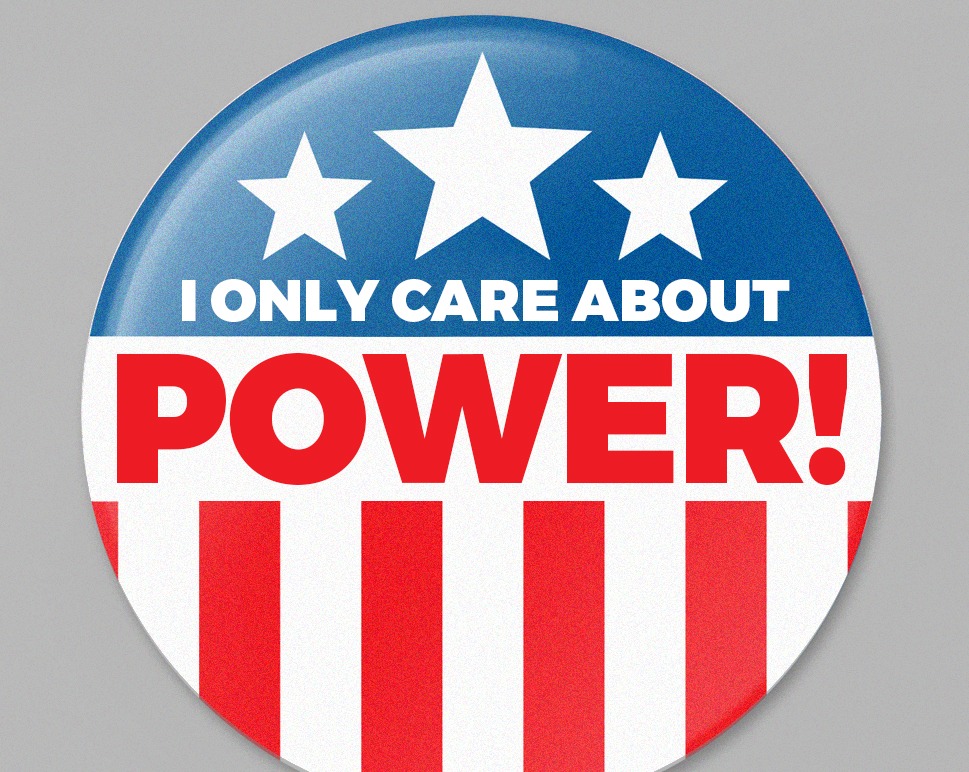I probably don’t need to tell you that politics in this country has become a mess. You see it on social media. You read about it in the newspaper. The act of legislating has shifted from a genuine debate between policies to a nasty battle between politicians.
Insults. Personal attacks. Vitriol. Condescending language.
And then there’s the corruption. The lying. The straight-up criminal activity. We see this on both sides of the aisle.

But, honestly, I don’t know what’s worse: our politicians’ poor behavior or the way they address their misdeeds. They deflect blame. They point fingers. They lash out at reporters and claim it’s all a witch hunt. They address everything but the very thing of which they’re accused.
I’m talking about “whataboutism.”
Instead of responding to a scandal or a controversy with integrity and honesty, they switch the subject. What about him? What about her? What about this? What about that?
I’m not a fan, and I suspect you aren’t either. The thing is, it’s not only the politicians who are responsible for this toxic environment. We, the voting public, are enabling this behavior. Or as C.S. Lewis said, “One of the most cowardly things ordinary people do is to shut their eyes to facts.”
Without question, we’re giving our elected leaders a pass. And I believe that’s because of the inconsistency between our personal values and our politics.
Look in the mirror
Why do we tend to praise friends and family members who admit their mistakes and take genuine responsibility for their transgressions or inappropriate behavior, yet many see that noble quality as a weakness with politicians?
It’s a contradiction, don’t you think? Owning up to one’s blunders and lack of judgment is a universal virtue; it’s baked into the fabric of this country. We appreciate when a friend says, “Sorry man, I screwed up,” or when your spouse says, “That was wrong, I shouldn’t have done that.”
In fact, when those around us come clean, we end up feeling closer to them. The more they bare their souls, the more our respect and admiration grow.

But when someone in our circle twists the truth and makes excuses, the gap between their mistake and accepting their apology only widens. And the original problem gets even worse when they revert to “whataboutism.”
Yet many people on both sides of the aisle feel whataboutism is perfectly legitimate for those we elect to lead our country.
What gives?
Take me out to the ballgame
I’m certainly not a trained sociologist or psychologist. There’s a jumble of interwoven reasons why people accept — and even applaud — whataboutism. But from my humble perch here in rural North Carolina, it’s clear that whataboutism thrives today because too many citizens see politics as a team sport.
They cheer for their team. They want their team to win at all costs. It’s tribal, bordering on religious fervor. As such, they defend behavior from their team that they would not accept or tolerate if it came from the other team.
Metaphorically, they can watch a replay that unambiguously, without a shadow of a doubt, shows there was indeed a foul, the player was indeed out of bounds, the ball indeed hit the ground before it was caught, you name it. Yet they’ll still believe their team got robbed.
Just the same, people can read how “their” guy or gal politician — based on clear evidence — lied, committed fraud, or broke laws or rules and yet … they’re cool with it. The old adage about facts are facts and won’t disappear on account of one’s likes or dislikes is seemingly out the door.
Huh?
The thinking behind the inconsistency
I haven’t learned to read minds (not yet, at least). However, I don’t believe those people condone illegal or immoral actions. Far from it. Rather, they rationalize the politician’s behavior. They perform complicated mental gymnastics to either defend the poor behavior or to confidently claim that the accusation itself has no merit.
This type of thinking has been labeled “cognitive dissonance.” It’s a term for “the state of discomfort felt when two or more modes of thought contradict each other.” According to the theory, “cognitive dissonance proposes that people are averse to inconsistencies within their own minds.”

Simply put, inconsistency in thought doesn’t feel so good. As such, people will do whatever it takes to not admit they’re wrong. And that seems to increasingly be the case when it comes to political issues.
What do we need to do to get back to consistency with our values?
A matter of perspective
If my wife asks me why I didn’t wash the car, I can’t say, “What about all the vacuuming I did last week?” That doesn’t fly.
If an employee doesn’t complete a task and the boss asks about it, it’s not legit to say, “Well, Sally didn’t finish her assignment either.” That dog don’t hunt.
You see, whataboutism has about zero chance of working in day-to-day life. If anything, it’s a tactic most often used by children, who will do and say whatever comes to mind to evade responsibility. That makes sense — they don’t know any better.
But politicians aren’t children. They are adults who we elect to do essential work for our country. To protect us, to expand our possibilities, to correct injustice, and to make life better for everyone from all backgrounds.
When we vote for someone, we inherently trust that they will fulfill their promises to the best of their abilities. Implicit in that trust is a belief that they will act with honor and put what’s best for the country ahead of what’s best for them or their party.
Whataboutism, however, screams, “I only care about holding on to my power.” Which, in turn, creates even more division among the parties and across the citizenry of this country.

Let’s be honest
I’m not a parent, but whataboutism clearly is not setting a good example for our youth. Children need to be raised to acknowledge when they’re wrong. They should learn to take responsibility for their mistakes. They should be taught to win with humility and lose with grace.
In short, children and young adults need to understand the importance of being honest with themselves. But they can only fully learn that lesson if we, the adults, aren’t first honest with ourselves.
Do a quick mental exercise. Think about a politician from the party you typically don’t support. Choose someone in that party who had a case of whataboutism. If that individual, in the same situation, were associated with your party, would you feel different about their whataboutism?
Be honest. Same poor behavior, same excuses, different party.
Be honest. Are you willing to defy your deeply held values just so your team can win?
Everything starts with the people. Change begins in our neighborhoods. Together, we can paint a better political picture.

We can reduce the great divide, the hate, and even the violence. When we don’t tolerate whataboutism, we’re better off as individuals and better of as a society. Let’s do what’s right — not what’s right for our team.











Reed Sprague
You did it again, Lee. A tough, sensitive matter dealt with head on yet appropriately and respectfully. Please keep writing. You have a gift. Thank you for sharing it.
Terry Carter Lloyd
Brilliant analogy, Lee. I strongly disagree with the thought of our society and the acceptance of “Whataboutism.” Your description was on point; however, I question what happened to truth, integrity, purpose and do the right thing? We have gone to opposite extremes in politics and I feel that politicians are only in it to win for themselves. Americans need to stop blaming each other and learn to accept the opinions of others without starting wars based on words. This country needs help and I pray to God that he helps us realize that we can once again be the “United States of America.” Great blog, I will be sharing. Rant over!
Patricia Hemmerling
Bravo! You nailed it! Absolutely brilliant blog. And you stated the obvious with total class! Well done, my dear friend. Please be sure to post in Facebook!